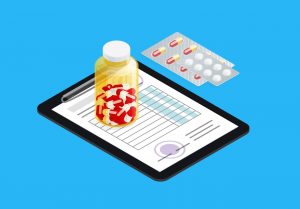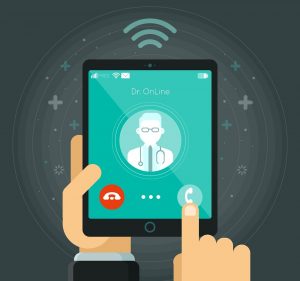Remember when patient charts used to be hung at the end of a patient’s bed or on the door to their room at the hospital? Seems like ancient history, doesn’t it?
More often than not these days, aside from the patient’s vitals scribbled on a nearby whiteboard, any relevant medical information is safely (not to mention privately) stored in an electronic health records (EHR) system. Nurses have computers attached to their carts, and attending physicians are more likely to be reading from a tablet than a clipboard. Each team that comes through has access to the necessary patient records and can update data almost instantaneously.
While the digitization of health records certainly accelerates communication across departments, it also creates a better flow for patient care. Information contained within electronic records can include past and current medications, allergies, radiology and laboratory results, shots records, and any treatments the patient is currently undergoing. With all this info available, healthcare providers are able to more quickly assess a patient’s needs and begin appropriate treatment.
In recent years, the use of EHRs has been increasingly adopted by healthcare systems nationwide in an effort to improve the quality of care delivered. Evidently, these efforts are paying off. According to HealthIT.gov, 75% of healthcare providers say that their EHR systems empowers them to deliver superior patient care, which ultimately results in greater patient satisfaction rates and fewer medication errors, among other benefits.
In this article, we’ll explore a number of specific ways in which EHRs can make a significant, positive impact on the quality of patient care.
9 Ways EHR Implementation Can Improve Patient Care
Coordination of Care
It’s essential that every medical professional in a patient’s care team has quick access to all of the patient’s essential health records, including current diagnoses, medications, and treatments. EHRs provide all that and more, and they also make it easy for healthcare providers to seamlessly share information with each other, even across multiple practices. Improved care coordination streamlines the processes of diagnosis and clinical decision-making and helps the patient avoid duplicate tests or procedures.
Diagnostic Capability
When healthcare providers have access to a patient’s entire health history, they are better positioned to accurately diagnose the patient. EHR software allows physicians to view lab results, procedures, surgeries, and past diagnoses. Prior issues, allergies, and other important factors are less likely to be overlooked, resulting in fewer medical errors. This also takes the responsibility of trying to remember their history and properly communicate it to doctors out of the patient’s hands.
Clinical Alerts & Reminders
Clinical alerts and reminders are built into the software of most EHR systems. These alerts can be used to remind healthcare providers when certain preventive and screening measures are due or overdue; send patients reminders about upcoming appointments; and warn clinicians when a new medication is prescribed that’s contraindicated based on the patient’s other health conditions, allergies, or medications.
Consolidation of Data
An EHR system is able to compile, analyze, and communicate patient information in a manner that allows clinicians to consider all aspects of the patient’s condition at once. Since healthcare providers have access to this data in advance, patients can be attended to without first having to recount their entire treatment story.
This aggregation of information allows medical professionals to provide significantly better communication quality, thorough care monitoring, and enhanced patient and family education. EHR software also greatly lessens the likelihood of human error, since providers are no longer required to scribble notes, outline care plans, and write indecipherable prescriptions by hand.
Safe, Reliable Prescriptions
Most EHR software has an e-prescribing function built in, which allows physicians and other healthcare providers to send patients’ prescriptions electronically to pharmacies. This convenient feature helps eliminate errors caused by illegible handwriting and simplifies the process of getting patients their much-needed medications. Patients can reasonably expect that their prescriptions will be transmitted, filled, and waiting for them at the pharmacy not long after they leave the provider’s office.
Increased Efficiency
EHRs have considerably enhanced efficiencies in workflow by reducing the time needed to pull charts, increasing access to comprehensive patient data, helping manage prescriptions, and facilitating patient appointment scheduling. When physicians spend less time searching for reports or results, they are able to see more patients in a workday – this results in reduced wait times for patients as well.
Electronic health records software also streamlines the process of patient information forms that need to be filled out on a routine basis. Forms need only to be completed once and synchronized with the system for providers and staff to access them as needed. In addition, administrative staff is able to file insurance claims immediately from the provider’s office, and the capacity for electronic referrals makes it easier for patients to receive follow-up care with specialists.
Patient Engagement
A patient portal integrated into the EHR allows patients to view their health records, doctors’ notes, vaccination history, lab and other diagnostic results, current medications, and diagnoses. In addition, the patient portal can be used to send and receive secure messages to and from healthcare providers; request appointments, prescription refills, and referrals; review dosage recommendations and harmful drug interactions; and pay invoices.
Having access to the patient portal not only strengthens the patient-provider relationship, but also engages patients in the decision-making process with clinicians and helps individuals become more engaged in their own healthcare.
Public Health Outcomes
Gaining access to electronic health data about the total population of patients a healthcare provider serves affords providers the opportunity to look more purposefully at the needs of patients who are afflicted with a specific ailment, are eligible for particular preventative measures, or are currently taking certain medications.
EHRs can also be used to identify patterns of potentially connected adverse events and allow at-risk patients to be alerted quickly. Improving the quality of overall patient care and treatment outcomes involves singling out patients who have yet to undergo critical screening examinations. These precautionary measures can uncover evidence of life-threatening diseases sooner than ever before, thereby improving public health outcomes.
Patient Safety & Satisfaction
Safeguarding patients by checking for medication contraindications and potential drug interactions with other prescribed medications not only enriches patient care, but can actually save lives. Meaningful communication among patients, primary care, and other care providers contributes toward greater patient satisfaction and generally improves clinical outcomes.
CONCLUSION
With the steady surge that technology has made in the healthcare industry, it’s evident that processes will only continue to become more streamlined. New technology is ushering in new ways to practice, such as telemedicine and wearable health devices. These new methods will likely become more incorporated into the overall scope of patient care with EHR systems binding it all together.
The future of any new technology lies in its ability to rapidly access accurate, up-to-the-minute patient information. Medical professionals, from doctors and nurses to insurance staff, can anticipate processes becoming more intuitive, while patients can reap the benefits of receiving exceptional care due to their critical data being readily available to their care team.
While there are challenges associated with choosing and correctly implementing the proper EHR software for your specific practice, adopting the ideal solution will unquestionably streamline methods, bolster efficiency, and improve overall patient care.
EncounterWorks is a completely integrated system that combines data management, billing, and EHR functions into one easy, smart, and flexible platform. Our innovative patient record solution, combined with our rapid clinical notation system, allows providers to get in and out of the patient chart faster than ever and still produce quality notes. Administrative staff will be able to access patient demographics and billing without accessing a dozen different screens. If your healthcare practice could benefit from an EHR system that actually works like it’s supposed to, give us a call at 877.884.3367!













